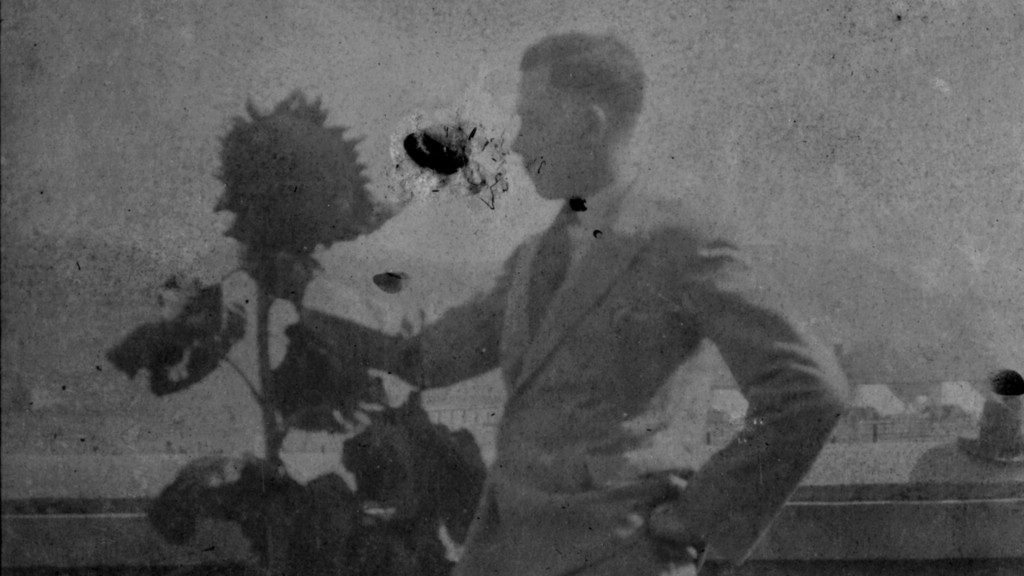Miranda Pennell originally trained in contemporary dance and later studied visual anthropology. Pennell’s video work until 2007 explored different forms of collective performance and has been screened internationally, including via broadcast and artists’ film exhibitions. Her recent moving-image work uses material from colonial archives as the starting point for investigations into the colonial imaginary. Her film “Why Colonel Bunny Was Killed” (2010) was awarded best international film at the Images Festival, Toronto, and Courtisane Festival of Media Art, Ghent. “The Host” (2015) is Miranda Pennell’s first feature-length film. (Press materials)
“The Host” will premiere at the 2015 BFI London Film Festival on October 15.
W&H: Please give us your description of the film playing.
MP: “The Host” is a film constructed from British archive images from Iran that is neither documentary nor fiction. While investigating my late parents’ involvement with the Anglo-Iranian Oil Company (BP) I came across the letters of a petroleum geologist in Iran in the ’30s, who was later to embark on a search for the origins of civilization.
The film sets out on its own exploration to decipher signs from fragmented images buried in the BP archive. It is a journey through images of the past that interweaves stories drawn from personal memory with those from the records of an imperial history, gradually building a picture of a 20th century colonial encounter. Ultimately, it’s about the stories we tell, both about ourselves and others, the facts and fictions we live by — and their consequences.
W&H: What drew you to this story?
MP: My father had joined the Anglo-Iranian Oil Company as an engineer in 1946 and our family lived in Iran during two separate postings. The starting point for “The Host” was a disorderly mass of materials drawn from BP’s photographic archive documenting the company’s origins in Iran, which I wanted to bring to life. I was interested in the role of BP and the British government in Iran’s traumatic 20th century.
It became apparent that the intersection of an imperial history and a personal history would provide a way to mediate the abstractions of big historical events through living memory and the particularity of personal experience, albeit via the experience and testimony of the colonizers.
As I put the archival images together, I looked for coincidences and allowed my speculations to create connections with other images and stories. Although all of the film’s sources are either archival or family documents, the film often takes on a fictional character. This happens partly because the film is narrated as a dramatization of my historical investigation, but mainly because it deals with the fantasies and projections of the British colonizers. It is this psychic dimension of the colonial that I wanted make palpable through the film because of its persistence and contemporary relevance.
The title “The Host” refers to one of the key figures in the film — a contemporary of my parents who hosted many corporate parties in Tehran in the late ’60s — and also to the image of Iran as the host nation of the British for much of the 20th century, which to me suggests the relationship between parasite and host.
W&H: What was the biggest challenge in making the film?
MP: The starting point of the film was the hundreds of archival fragments I had collected and which threatened to overwhelm me. The script emerged slowly and tentatively. It took a long time to work out just how I was going to knit the different stories together into a whole.
W&H: What do you want people to think about when they are leaving the theater?
MP: I’d like people to think about our entangled collective histories, about the contemporary legacies of colonial politics and be inspired to conceive of a more just, shared future.
W&H: What advice do you have for other female directors?
MP: Don’t seek approval from others.
W&H: What’s the biggest misconception about you and your work?
MP: Many years ago I trained as a dancer and then started filmmaking by making performance-related films. Today I am often puzzled to find that people who never knew me when I was a dancer like to retain this one part of my biography above all others, even though it has little to do with my life and work now.
W&H: How did you get your film funded? Share some insights into how you got the film made.
MP: I realized that this archive-led film would be labor-intensive and time-consuming for me and that the outcome could not be predicted at the outset. So I developed it as part of a practice-led Ph.D. over four years, on and off. I was supported by an Arts and Humanities Research Council maintenance grant for three years, and separately I also had a small development grant from the Arts Council England.
W&H: Name your favorite woman-directed film and why.
MP: “Leila and the Wolves” (1984), directed by Heiny Srour, is an extraordinary film that interweaves contemporary and historical archive footage within fiction and fairy-tale modes of storytelling to deliver a powerful political critique. It’s a film about the political struggles of women in Palestine (and in Lebanon) within and against “heroic” histories made by men.
It is fiercely anti-colonial, witty, magical and horrifying. I love it because it’s so ambitious — aesthetically and politically — and it’s a real one-off that has really stood the test of time. I wish people would screen it and discuss it more often.







